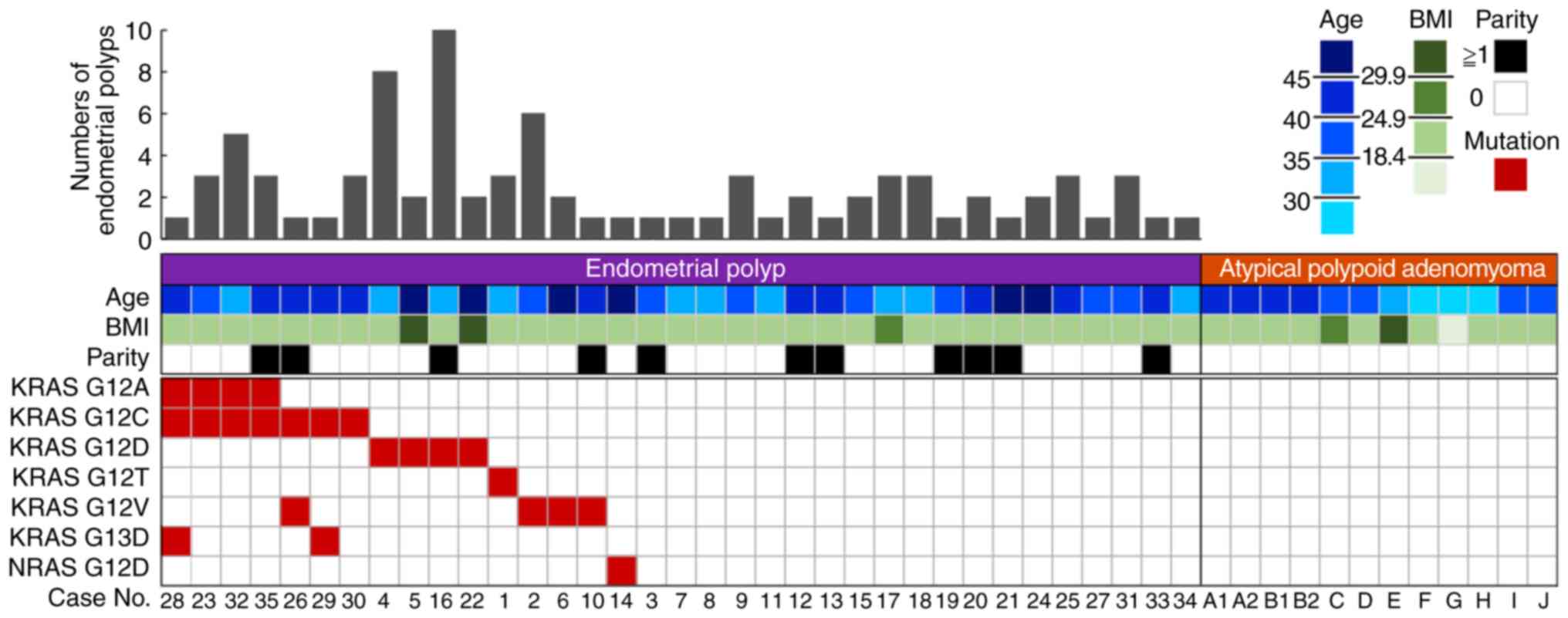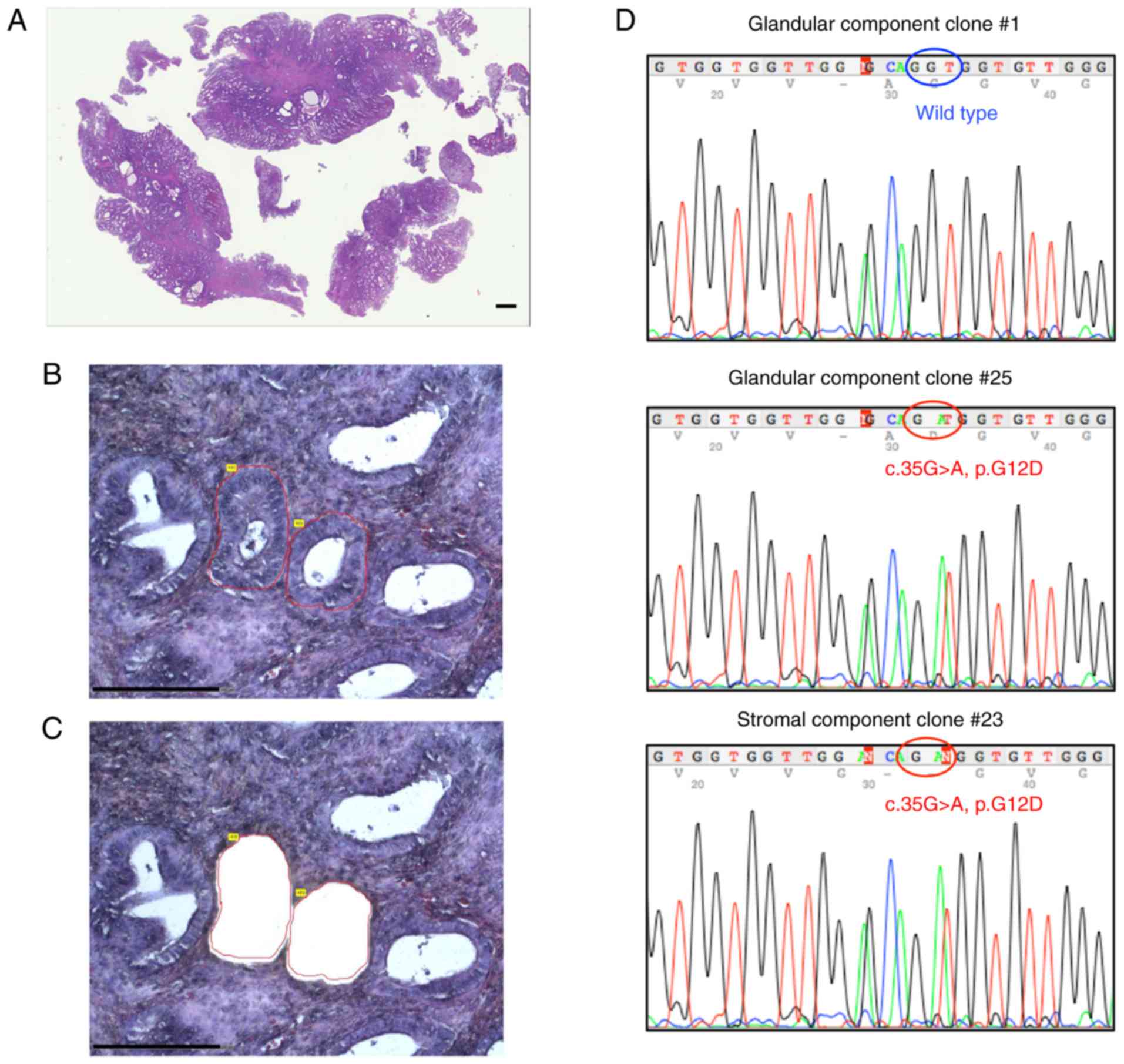|
1
|
Dreisler E, Stampe Sorensen S, Ibsen PH
and Lose G: Prevalence of endometrial polyps and abnormal uterine
bleeding in a Danish population aged 20–74 years. Ultrasound Obstet
Gynecol. 33:102–108. 2009. View
Article : Google Scholar : PubMed/NCBI
|
|
2
|
Kurman RJ, Carcangiu ML, Herrington CS and
Young RH: WHO Classification of Tumours of Female Reproductive
Organs4th. WHO Classification of Tumours. 6. World Health
Organization; Lyon: 2014
|
|
3
|
Özkan NT, Tokmak A, Güzel Aİ, Özkan S and
çİçek MN: The association between endometrial polyps and metabolic
syndrome: A case-control study. Aust N Z J Obstet Gynaecol.
55:274–278. 2015. View Article : Google Scholar : PubMed/NCBI
|
|
4
|
Serhat E, Cogendez E, Selcuk S, Asoglu MR,
Arioglu PF and Eren S: Is there a relationship between endometrial
polyps and obesity, diabetes mellitus, hypertension? Arch Gynecol
Obstet. 290:937–941. 2014. View Article : Google Scholar : PubMed/NCBI
|
|
5
|
Tsujioka H, Hachisuga T, Fukuoka M, Ueda
T, Miyahara D, Horiuchi S, Shirota K, Yoshizato T, Emoto M,
Miyamoto S and Kawarabayashi T: Monitoring of endometrial K-ras
mutation in tamoxifen-treated patients with breast cancer. Int J
Gynecol Cancer. 19:1052–1056. 2009. View Article : Google Scholar : PubMed/NCBI
|
|
6
|
Tsujioka H, Hachisuga T, Hikita S, Ueda T,
Yotsumoto F, Shirota K, Yoshizato T, Kawarabayashi T, Kuroki M and
Miyamoto S: Apoptosis as a possible candidate mechanism for removal
of tamoxifen-related endometrial cells with KRAS mutations.
Anticancer Res. 30:3119–3123. 2010.PubMed/NCBI
|
|
7
|
Dal Cin P, Wanschura S, Kazmierczak B,
Tallini G, Dei Tos A, Bullerdiek J, Van den Berghe I, Moerman P and
Van den Berghe H: Amplification and expression of the HMGIC gene in
a benign endometrial polyp. Genes Chromosomes Cancer. 22:95–99.
1998. View Article : Google Scholar : PubMed/NCBI
|
|
8
|
Indraccolo U, Di Iorio R, Matteo M, Corona
G, Greco P and Indraccolo SR: The pathogenesis of endometrial
polyps: A systematic semi-quantitative review. Eur J Gynaecol
Oncol. 34:5–22. 2013.PubMed/NCBI
|
|
9
|
Zhu Y, Du M, Yi L, Liu Z, Gong G and Tang
X: CD4+ T cell imbalance is associated with recurrent
endometrial polyps. Clin Exp Pharmacol Physiol. 45:507–513. 2018.
View Article : Google Scholar : PubMed/NCBI
|
|
10
|
Rios SS, Andrade RV, Pereira RW, Wall NR,
Bahjri K, Caldas É, Cavalcante L and Figueiredo F: Microsatellite
instability in endometrial polyps. Eur J Obstet Gynecol Reprod
Biol. 153:193–197. 2010. View Article : Google Scholar : PubMed/NCBI
|
|
11
|
Sikkema-Raddatz B, Johansson LF, de Boer
EN, Almomani R, Boven LG, van den Berg MP, van Spaendonck-Zwarts
KY, van Tintelen JP, Sijmons RH, Jongbloed JD and Sinke RJ:
Targeted next-generation sequencing can replace Sanger sequencing
in clinical diagnostics. Hum Mutat. 34:1035–1042. 2013. View Article : Google Scholar : PubMed/NCBI
|
|
12
|
Forbes SA, Beare D, Gunasekaran P, Leung
K, Bindal N, Boutselakis H, Ding M, Bamford S, Cole C, Ward S, et
al: COSMIC: Exploring the world's knowledge of somatic mutations in
human cancer. Nucleic Acids Res 43 (Database Issue). D805–D811.
2015. View Article : Google Scholar
|
|
13
|
Nakagawa H and Fujita M: Whole genome
sequencing analysis for cancer genomics and precision medicine.
Cancer Sci. 109:513–522. 2018. View Article : Google Scholar : PubMed/NCBI
|
|
14
|
Ng SB, Buckingham KJ, Lee C, Bigham AW,
Tabor HK, Dent KM, Huff CD, Shannon PT, Jabs EW, Nickerson DA, et
al: Exome sequencing identifies the cause of a mendelian disorder.
Nat Genet. 42:30–35. 2010. View
Article : Google Scholar : PubMed/NCBI
|
|
15
|
Margulies M, Egholm M, Altman WE, Attiya
S, Bader JS, Bemben LA, Berka J, Braverman MS, Chen YJ, Chen Z, et
al: Genome sequencing in microfabricated high-density picolitre
reactors. Nature. 437:376–380. 2005. View Article : Google Scholar : PubMed/NCBI
|
|
16
|
Bentley DR, Balasubramanian S, Swerdlow
HP, Smith GP, Milton J, Brown CG, Hall KP, Evers DJ, Barnes CL,
Bignell HR, et al: Accurate whole human genome sequencing using
reversible terminator chemistry. Nature. 456:53–59. 2008.
View Article : Google Scholar : PubMed/NCBI
|
|
17
|
Yoshino T, Muro K, Yamaguchi K, Nishina T,
Denda T, Kudo T, Okamoto W, Taniguchi H, Akagi K, Kajiwara T, et
al: Clinical validation of a multiplex kit for RAS mutations in
colorectal cancer: Results of the RASKET (RAS KEy Testing)
prospective, multicenter study. EBioMedicine. 2:317–323. 2015.
View Article : Google Scholar : PubMed/NCBI
|
|
18
|
Pappa KI, Choleza M, Markaki S, Giannikaki
E, Kyroudi A, Vlachos G, Voulgaris Z and Anagnou NP: Consistent
absence of BRAF mutations in cervical and endometrial cancer
despite KRAS mutation status. Gynecol Oncol. 100:596–600. 2006.
View Article : Google Scholar : PubMed/NCBI
|
|
19
|
Garcia-Dios DA, Lambrechts D, Coenegrachts
L, Vandenput I, Capoen A, Webb PM, Ferguson K; ANECS, ; Akslen LA,
Claes B, et al: High-throughput interrogation of PIK3CA, PTEN,
KRAS, FBXW7 and TP53 mutations in primary endometrial carcinoma.
Gynecol Oncol. 128:327–334. 2013. View Article : Google Scholar : PubMed/NCBI
|
|
20
|
van der Putten LJM, van Hoof R, Tops BBJ,
Snijders MPLM, van den Berg-van Erp SH, van der Wurff AAM, Bulten
J, Pijnenborg JMA and Massuger LFAG: Molecular profiles of benign
and (pre)malignant endometrial lesions. Carcinogenesis. 38:329–335.
2017. View Article : Google Scholar : PubMed/NCBI
|
|
21
|
Cancer Genome Atlas Research Network, ;
Kandoth C, Schultz N, Cherniack AD, Akbani R, Liu Y, Shen H,
Robertson AG, Pashtan I, Shen R, et al: Integrated genomic
characterization of endometrial carcinoma. Nature. 497:67–73. 2013.
View Article : Google Scholar : PubMed/NCBI
|
|
22
|
Yeramian A, Moreno-Bueno G, Dolcet X,
Catasus L, Abal M, Colas E, Reventos J, Palacios J, Prat J and
Matias-Guiu X: Endometrial carcinoma: Molecular alterations
involved in tumor development and progression. Oncogene.
32:403–413. 2013. View Article : Google Scholar : PubMed/NCBI
|
|
23
|
Lorentzen JA, Grzyb K, De Angelis PM, Hoff
G, Eide TJ and Andresen PA: Oncogene mutations in colorectal polyps
identified in the norwegian colorectal cancer prevention (NORCCAP)
screening study. Clin Med Insights Pathol. 9:19–28. 2016.
View Article : Google Scholar : PubMed/NCBI
|
|
24
|
Juárez M, Egoavil C, Rodriguez-Soler M,
Hernández-Illán E, Guarinos C, García-Martínez A, Alenda C,
Giner-Calabuig M, Murcia O, Mangas C, et al: KRAS and BRAF somatic
mutations in colonic polyps and the risk of metachronous neoplasia.
PLoS One. 12:e01849372017. View Article : Google Scholar : PubMed/NCBI
|
|
25
|
Yamane LS, Scapulatempo-Neto C, Alvarenga
L, Oliveira CZ, Berardinelli GN, Almodova E, Cunha TR, Fava G,
Colaiacovo W, Melani A, et al: KRAS and BRAF mutations and MSI
status in precursor lesions of colorectal cancer detected by
colonoscopy. Oncol Rep. 32:1419–1426. 2014. View Article : Google Scholar : PubMed/NCBI
|
|
26
|
Kato S, Lippman SM, Flaherty KT and
Kurzrock R: The conundrum of genetic ‘Drivers’ in benign
conditions. J Natl Cancer Inst. 108(pii): djw0362016. View Article : Google Scholar : PubMed/NCBI
|
|
27
|
Anglesio MS, Papadopoulos N, Ayhan A,
Nazeran TM, Noë M, Horlings HM, Lum A, Jones S, Senz J, Seckin T,
et al: Cancer-associated mutations in endometriosis without cancer.
N Engl J Med. 376:1835–1848. 2017. View Article : Google Scholar : PubMed/NCBI
|
|
28
|
Noe M, Ayhan A, Wang TL and Shih IM:
Independent development of endometrial epithelium and stroma within
the same endometriosis. J Pathol. 245:265–269. 2018. View Article : Google Scholar : PubMed/NCBI
|
|
29
|
Suda K, Nakaoka H, Yoshihara K, Ishiguro
T, Tamura R, Mori Y, Yamawaki K, Adachi S, Takahashi T, Kase H, et
al: Clonal expansion and diversification of cancer-associated
mutations in endometriosis and normal endometrium. Cell Rep.
24:1777–1789. 2018. View Article : Google Scholar : PubMed/NCBI
|
|
30
|
Heatley MK: Atypical polypoid adenomyoma:
A systematic review of the English literature. Histopathology.
48:609–610. 2006. View Article : Google Scholar : PubMed/NCBI
|
|
31
|
Ota S, Catasus L, Matias-Guiu X, Bussaglia
E, Lagarda H, Pons C, Muñoz J, Kamura T and Prat J: Molecular
pathology of atypical polypoid adenomyoma of the uterus. Hum
Pathol. 34:784–788. 2003. View Article : Google Scholar : PubMed/NCBI
|
|
32
|
Takahashi H, Yoshida T, Matsumoto T,
Kameda Y, Takano Y, Tazo Y, Inoue H and Saegusa M: Frequent
β-catenin gene mutations in atypical polypoid adenomyoma of the
uterus. Hum Pathol. 45:33–40. 2014. View Article : Google Scholar : PubMed/NCBI
|
|
33
|
Němejcová K, Kenny SL, Laco J, Škapa P,
Staněk L, Zikán M, Kleiblová P, McCluggage WG and Dundr P: Atypical
polypoid adenomyoma of the uterus: An immunohistochemical and
molecular study of 21 Cases. Am J Surg Pathol. 39:1148–1155. 2015.
View Article : Google Scholar : PubMed/NCBI
|
















